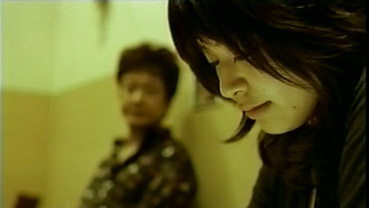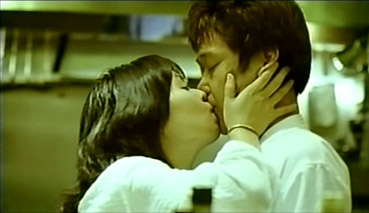|
You
probably need more than just a passing awareness of Japanese
cinema to have even heard of pinku eiga, or pink film, a
uniquely Japanese form of softcore pornography that flourished
in the 1960s and 70s. Initially the product of low budget
independent companies, their widespread success ensured
that the bigger studios eventually got in on the action – Nikkatsu in particular produced so many that their name
became almost synonymous with the genre. The form remained
popular until the mid eighties, when it lost a lot of ground
to home video, which enabled fans to enjoy the content in
the privacy of their own homes.
Unlike
their Western equivalents, if the West can be said to have
one, pink films were almost always more than just a string
of sex scenes loosely linked by ludicrously under-developed
plots or shabby comedy. Narrative and character were given
the same degree of attention as the erotica, and even social
or political aspects were incorporated into many stories.
The genre's heyday may be over but the films are still being
made, though it's rare to find one getting any sort of distribution
outside of Japan. Enter Redemption Films and their DVD release
of Bitter Sweet [Bitâ suîto],
a recent entry into the genre whose dramatic focus is the
increasing instability and non-permanence of modern relationships.
It's the second film – and second pink film – from director
Mitsuru Meiki, whose 2003 debut feature was the slightly
more widely seen Hatsujô kateikyôshi:
sensei no aijiru [The Glamorous Life of
Sachiko Hanai].

Shoko
and Tamura are a young couple soon to be married, but Shoko
is starting to have her doubts, something she reveals over
a restaurant meal to her close friend Mika, who is single
but eagerly on the lookout for the right man. Late the following
evening, Shoko returns to the restaurant to talk to owner
and chef Kudo (played by writer-director and some time actor
Hitoshi Ishikawa). The two remember each other from the
registry office a couple of days earlier – when Shoko was
collecting her certificate of marriage registration, Kudo
was requesting the document to file for divorce. Shoko has
approached him to discuss her doubts, a woman on the brink
of marriage seeking the advice of a man whose own has begun
to fail. She ends up seducing him and an uncertain relationship
begins – Shoko quickly falls in lust with Kudo, but he is
reluctant to emotionally commit to her, his weariness with
his home life not yet strong enough for him to put pen to
divorce papers.
It's
a melancholic view of the changing face of relationships
and marriage in a country that once pointed to its low divorce
rate as a key element of its social stability. Sure, the
requisite number of sex scenes are there and are typically
shy of showing either genitalia or pubic hair (both forbidden
under current Japanese censorship laws), but they nonetheless
benefit from an unglamorous, matter-of-fact eroticism and
an almost seamless integration with the main narrative.
It's never just about arousing the audience – the sexually
forward females and initially surprised and even alarmed
males are sign of changed times in a once rigidly patriarchal
society, and each such sequence plays out in a way that
both expands on character detail and advances the story.
When Kudo has sex with his wife, for example, the act is
frantic but devoid of passion, its conclusion an almost
mechanical Kleenex wipe-off. There's no emotional investment
on Kudo's part, something he admits to and cares little
about in the argument that immediately follows – the true
state of their marriage and feelings for each other are
all captured in this short but telling scene.
For
a film of just an hour in length (a popular running time
for pink cinema), Bitter Sweet's deceptively
unhurried narrative is surprisingly busy with incident and
detail. The key supporting character of unhappy, heavy-drinking
Yoshida, for example, is initially unidentified, a broken
man haunted by his memories. But when he shows up unexpectedly
at the restaurant and drunkenly assaults Kudo, it becomes
clear that the two are not only connected but have a troubled
history, and one that is destined to affect Kudo's own future.
Even the background characters of Tamura and Mika have their
moment when the former is seduced by the latter, an encounter
that tells you a surprising amount about the feelings
and attitudes of both. Such detail is only possible because
the performances, in complete contrast to most western equivalents,
are as convincingly natural and understated as they would
be for any straight-up drama.

If
you're looking for an introduction to modern pink cinema
then you could do a lot worse than Bitter Sweet.
The nudity and (for the most part brief) sex scenes are
made to feel as integral to the story as the dialogue, while
the drama and social subtext is just well enough developed
to find the film an audience beyond the genre fandom.
Not
the most vibrant of transfers, the non-anamorphic 1.78:1
picture is nonetheless intermittently better than I was expecting, given that it's sourced from an analogue tape master
(the giveaway tracking blips are at the very bottom of the
screen when viewed without overscan). Contrast is good and
detail level reasonable, at least on well lit close-ups – on wider shots the picture softness is more evident. Zooming
in to fill the widescreen TV frame markedly depreciates
the picture quality.
A
functional Dolby 2.0 mono soundtrack whose unfussy mix and
sound recording reflect the film's obvious low budget. By
the halfway mark, however, a quite pronounced synchronisation
issue has developed that stays for a while, but does sort
itself out before the end.
Japanese
Box – Short Film Showcase (11:27)
A short film by UK director Tobias Tobbell that has nothing
to do with the main feature except for its Oriental characters
and the word 'Japanese' in the title. A horror story of
sorts involving two girls, a mysterious box and an overdressed
private investigator, it's driven along by the sort of emotionless,
dual character voice-over you only seem to find on British
short films and is not even a little bit creepy. The late film
integration of anime-style drawn imagery momentary enlivens
things. The picture has a fuzzy YouTube quality and almost
no shadow detail.
There
is also a brief Stills Gallery,
a Gallery of frame grabs from
the above film (why?), Trailers
for other Redemption titles Belcebu, 99
Women and Venus in Furs and an
extracts from 16 albums on the Triple Silence label. I know
this is a sell, but there's actually some interesting stuff
in this last one.
An
interesting and quite involving example of modern-day pink
cinema whose pleasingly low key approach to both its drama
and its sex scenes gives it an air of realism rare for sex
dramas or any nation. Redemption's DVD is not all it could
be, losing points for its non-anamorphic picture and a few
more for the analogue tape source, but it's sometimes better
than those two handicaps might make it sound. The synchronisation
issue is another thing entirely, although if you're watching
the subtitles and, well, the other action, you may not even
notice.
|